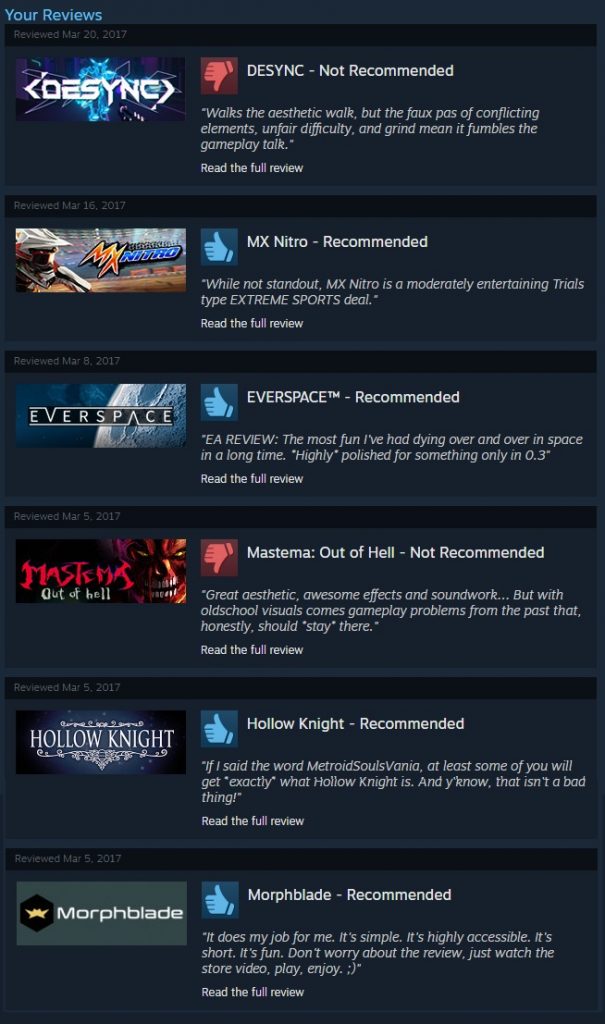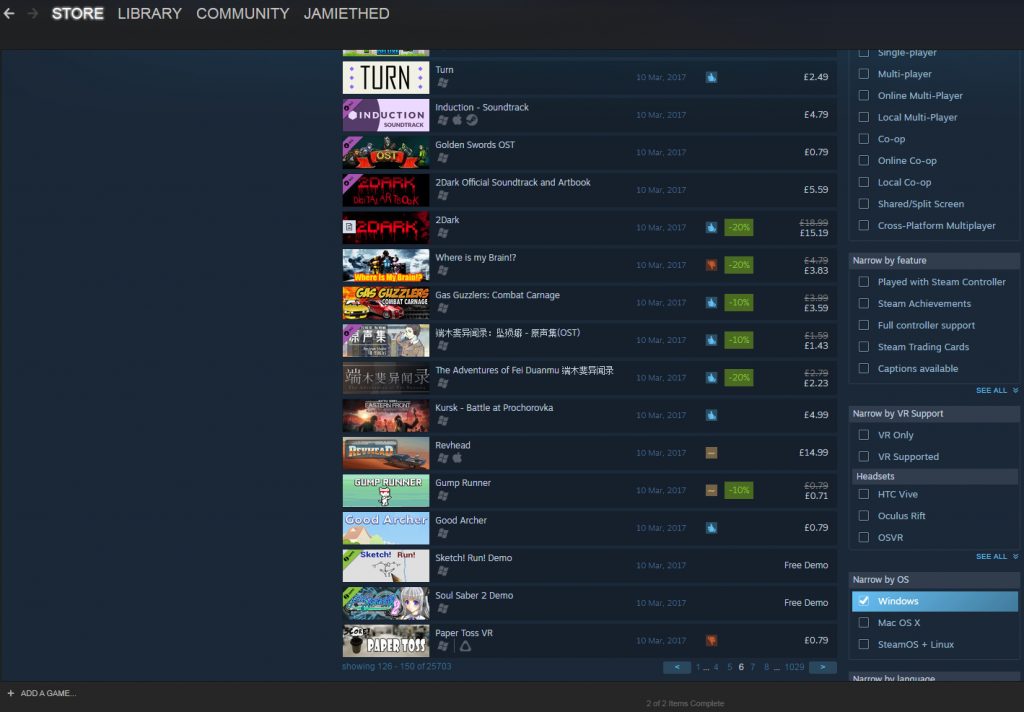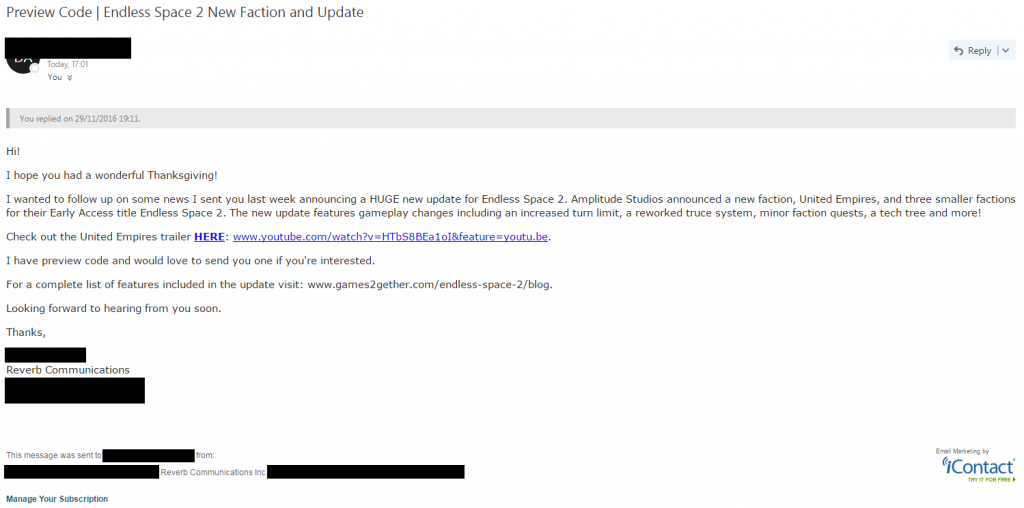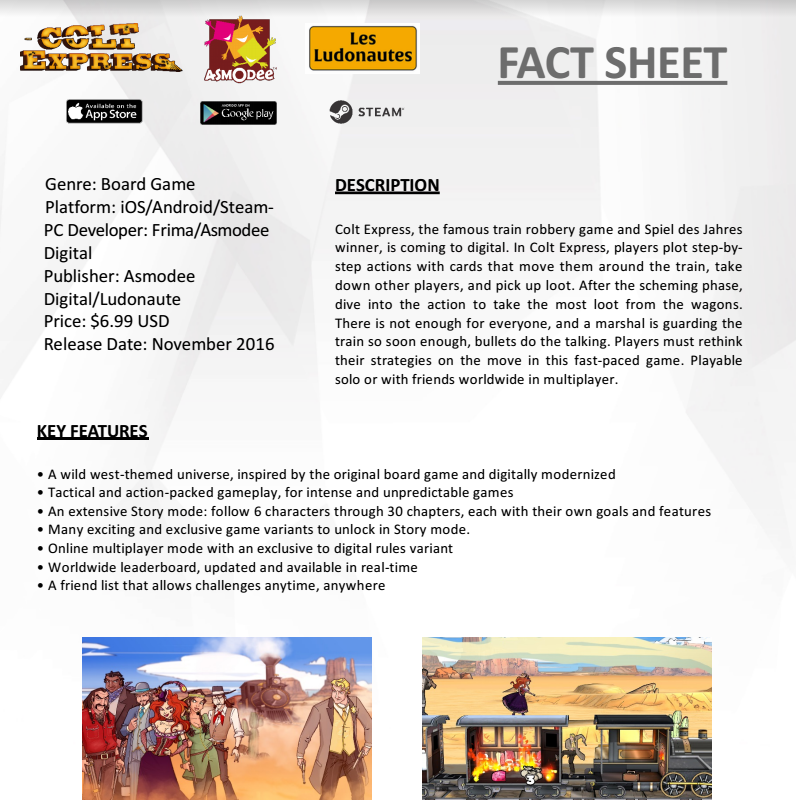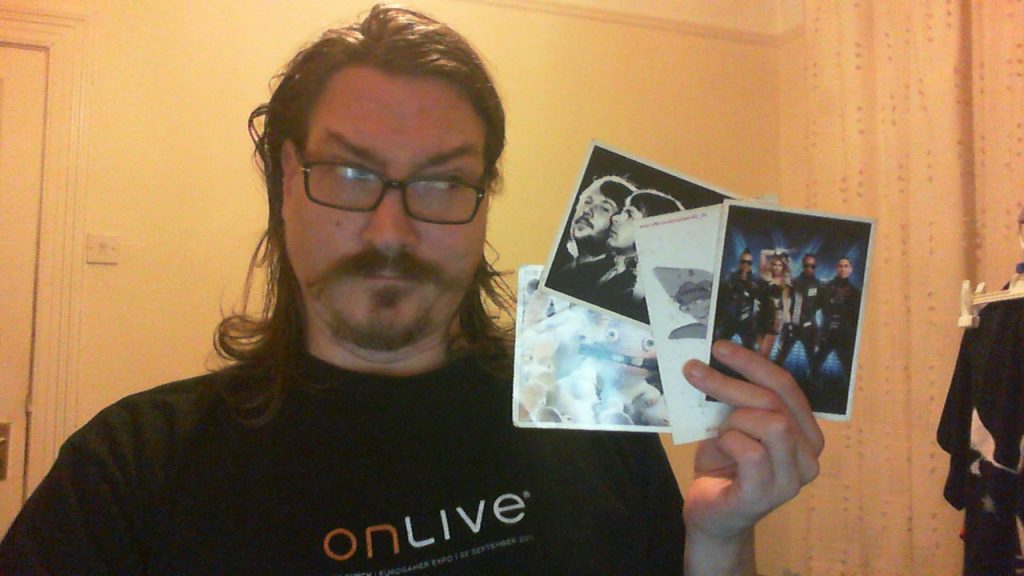This is a tough one for me to write, because it’s not only an admittance that not all is well with Games Journalism (The easy part), but I have to make sure this doesn’t sound like making excuses (The tough bit.) But let’s begin with why this article exists. It begins with a common accusation levelled against Game Journalism… Even by fellow Game Journalists.
“Why do folks repeat stories, and not do the digging on their own? Why aren’t there more articles probing the industry?”
It’s worded in many different ways, but that’s the general gist of it. And I’m going to break down for you why this is so. Keep in mind, this is going to be acknowledging multiple problems, in many different places, not all of which are in the province of Games Journalism specifically. Let’s begin.
Access, Access, Access
It is no secret that developers and publishers do not like bad things printed about them, especially if they are true. In fact, it’s true about everybody. It’s a thorny problem, and it’s compounded by the fact that, when it comes to examining things going on within the industry, they are the primary source. In fact, if it weren’t for employees wishing to anonymously come forward, and the occasional hint of a lawsuit, they would be the only source. They are certainly the only source that has final say on whether an outlet gets the review copies without having to put it on the expenses part of their budget, and interviews that would be on the record.
In fact, this is one of the major problems facing a game journalist who knows damn well something is rotten in the state of Devmark… The Eerie Silence. At least one outlet (Rock, Paper, Shotgun) has, in the past, directly noted that this is a tactic commonly used with awkward questions (The Silence: An Update, by John Walker), and many others have (for various reasons) had to write the words “We have reached out to the [developer/publisher] for comment. [End of sentence, no mention of a reply]”, or some variation thereof.
As much as I want developers and publishers to feel unafraid to talk to me, this will never really be the case, especially with the ones who know (As a collective) that they have practices or attitudes that are less than stellar. Making this worse is the fact that, when a developer or publisher blacklists you, you are most likely the last person to know, although you will suspect quite early on. Sometimes, you will never get confirmation unless someone reaches out. And that is generally unlikely.
Another fun thing with access is that, for the best investigation, you need to be on the ground floor. You need to be there. That’s not something that magically happens. You don’t wave a Make-Nice-Wand and an invitation magically appears. There’s a lot of diplomacy involved, sometimes a little luck, and a lot of struggling. The article on attitudes at the DigiPen Institute (Sex at a Four-Year Video Game College, by Jagger Gravning for Vice), for example, was not a case of “And Lo, The Writer Was Invited To See Stuff.” Considering the subject matter, it takes little imagination to see ways this article could have disappeared between “plan” (Not all of these investigations are planned, per se) and execution.
And, of course, they had to go there, where the story was… Which leads us nicely to another problem… One I’ve talked about (At length) before…
That ABBA Song… That Fucking ABBA Song.
I hope you know the one I mean… Many of you will, because for a while, it was quite fashionable to bawl out “MONEY MONEY MONEY… IT’S SO FUNNY… IN A RICH MAN’S WORLD!” when properly lubricated on a Saturday night. But now that I’ve made it clear, let’s explain, for the privileged and stubborn thinkers, why this is a problem.
I would love to write things examining nice workplaces. I would love to hold up examples of companies that succeed, and do so because of their progressive practices. It would help convince people that yes, you can make money, and not have to crunch, and not have to be an Old Boy’s Club. But there is a problem. A big one, completely unrelated to the problem of whether a company or institution wishes to talk to you in the first place.
You have to get there. Now, if you are working for a larger group, there is a higher chance that you will have the scratch to do such a thing… But for the majority of folks, including commissioned writers (As opposed to regular staff writers)… That isn’t the case. So you have two options. Only one of them is practical for many, only one of them is preferable. They are mutually exclusive.
The first is to be invited, all expenses paid. This, you may think, is the preferable one. But this is the practical one. Why would that be? Well, let’s remember the most common put-down for a review or preview that a reader disagrees with:
“THIS WAS A PAID FOR ANNOUNCEMENT”
Or some variation.
It’s blackly funny, actually. I’m pretty sure there are developers and publishers out there who’d love to show such things off, to as many people as possible, because it gets the word out. But what good is a message, however positive, that people don’t trust? That people don’t feel was earned by blood, sweat, and tears that, to be quite honest, isn’t really necessary? The preferable one would be to have the scratch or support beforehand to be able to do this… Oh. Wait. I know I don’t have that kind of bloody dough. And nor, in fact, do the vast majority of games writers. Funny, that.
And yes, there will be folks out there who shit on such sentiments regardless. I think we’ve covered that already (and will again). Unfortunately, that doesn’t really help when many of us, due to the inconsistent demands of our reader base, don’t feel confident accepting the promise of “Transport paid, food and drinks offered” type press events. Regardless of whether we are actually swayed by such things… I won’t, and can’t speak for everybody, but I know at least a few of us laugh, sarcastically and evilly, whenever someone says being paid by someone else to do our jobs biases us.
I’ll let you in on something that I will admit is not particularly nice of me. When Tim Willets was making his “Lineage of Awesome” speech at Eurogamer 2011, about Rage? I couldn’t help but snicker behind my hand. The speech was hype, pure and simple, and, in its way, hilarious considering I had been shooting largely identical masked blokes who were all voiced by perhaps two cockneys in a ruined building of the type we’ve all seen before not half an hour previously. Hype. I have a long held distrust of hype (Since before I became a games writer, in fact), while accepting that yes, it’s a thing all media have to do to get heard in this modern day of information overload and the fatigue and distrust of advertising, and it’s a thing that I am just as complicit in as the rest of the games industry.
Is that undiplomatic? Hell yes. Is it something that may not endear me to the folks at Id Software? Ohhhh yes. Equally, I’m not going to endear myself to fans of Rage. And I’m not going to endear myself to people who didn’t like Rage, but pre-ordered it, by pointing out that you fell for the hype. In a sense, that’s okay. It was, in its way, well crafted hype. It talked about what Id knew best, and them showing that they did certain things very well… Specifically, they are very good at making the experience of shooting mans a technically impressive one. Note I said technically impressive. All the MegaTextures in the world aren’t going to help you if the person buying your game gives not a single fuck about that, and instead gets pissed off that you didn’t actually put a real ending in.
PS – There are good things about Rage. There are good things about Tim Willets, who was a funny guy who said funny things that were intentionally funny in said speech. There were reasons why Rage didn’t have a proper ending. I am using this as an extreme example of how little other people paying for me to see supposedly shiny things matters compared to what you actually produce.
But this talk of inconsistency allows me to mention the Human Factor here.
You, The Reader. Yes, You. No, Not You.
Hoo boy. This part’s tough, for a lot of reasons. In a sense, my privilege (Being a white dude who is currently the same gender wot he was born as) “protects” me from this. Not making it so easy as typing some angry, ill considered words and hitting “THIS COMMENT FUCKING OWNS YOU (Regardless of whether it actually does)” also helps. But it never works forever, and sooner or later, someone pays the piper for saying things that aren’t popular (Or, more accurately, do not appear popular), but need to be said. And there’s not always a rhyme or a reason behind it either.
So, let’s mention a simple thing. Let’s see how far people get along this chain of thought before they start forming a “But, but, but…” in their minds. Sexism is bad. In fact, thinking someone’s opinion is worth less because they’re different than you is, in general, bad. They can be wrong, sure. But there are good reactions to someone being wrong, and there are bad reactions to someone being wrong. There are also incredibly bad, illegal, and/or highly fucking stupid ways to react.
“Female Technology Journalists Report Abuse Is Still The Name Of The Game”
“Racist Groups Use Computer Gaming To Promote Hate”
Those are just two pieces of writing, among a large pool, of prejudice in “our” industry. There are others, and they are pretty easy to find with only a tiny amount of Google-Fu. Especially in the past year, where these issues have come to the forefront of public attention because… Of the defensive reactions of the very same people who see nothing wrong with this, or ignore that this is happening, after they have done these things, and continue to do these things.
Part of this, sadly, is precisely because people care so much about video games. I’m writing this, fully expecting a huge fucking tidal wave of hate from haters who don’t want it generally known that they are haters (Who, bee tee dubs, generally reveal what haters they are by doing that. Something that doesn’t appear to have gotten through to at least some of them), with another wave coming from another direction of people who are afraid they could be lumped under this category, and think I’m talking about them, when, in fact, I’m not.
And it can apply to things that seem inconsequential to people who don’t play video games as well. Give a “pretty number” that’s seen as “too” low, or “too” high (Make no mistake, part of the reason I dislike “Pretty Numbers” is because reviewing is subjective), and people who seem to think it’s their god-given duty to defend their viewpoint that it’s the best thing since sliced bread (Until, you know… It isn’t anymore) will swarm from the woodwork with such well crafted satire as “BEST TITY 0/10 [negative review]” or insight like “You, [sir/madam/git] have completely misunderstood what [collective group of people who the writer of the comment has largely never met] were intending with what was obviously a masterpiece because [sometimes useful disagreements go here, but don’t lay money on it over, say, missing what was being said versus what they heard].”
Remember that thing about a common refutation of a review people disagree with being “Oh, you were paid to say that by someone”? Yup, that one’ll come out too, especially if it’s positive. If it’s negative, it’s usually something silly like “Doing it for the clicks.”
Misunderstanding criticism, and the goal of criticism, is a pretty common damn thing. When people say “You can like a thing, but not all of a thing”, they roll their eyes. Let’s give you an example.
I like Jonathan Coulton’s “Skullcrusher Mountain.” You may think that this song is the best thing since sliced bread. Or you may go the other way, and say that it is saying some things about relationships that are p. fucking terrible (IE – The song contains forced consent, which is a Bad Thing, leading to Bad Relationships and potentially Bad Times In Court if you copy the bloody song.) I agree with both these points. And I am, funnily enough, not being a hypocrite for doing so. Because both viewpoints are right. I appreciate the artistry behind the song, because it was intended to be a song about a Bond Villain pursuing a dysfunctional romantic relationship in the way they would (Because many characters in a Bond story, including James Bond himself, are misogynist fuckhead assholes). But that doesn’t change the fact that it is not a good song for people who have experienced any form of forced consent to hear, and that assuming this is a healthy attitude to emulate is capital-B Bad.
Explained like that, most of you will nod, and be perfectly fine with me continuing to enjoy the song, because I am aware of the shitty side of it. Some of you, however, will take an extreme position on this for or against. This is human nature. We’re all different. And we have different reasons for doing things.
You may be wondering what this has to do with investigative gaming journalism, the type meant to drag into the light the less than stellar aspects of the Industry that, if we want to do better, we should generally try and stop and/or make folks aware of.
Tell you what, go look at those investigative articles again. For or against a thing, and including the ones you found with your Google-Fu. Look at the comments section. Then think about how easy it is for people to yell at you about something on Twitter. Directly. Or bitch about you behind your back. Or make death threats.
Then realise that this is not a new story. Go look at other socially charged things, past and present. Look at how people reacted.
…The people who dare to write about these things are generally either really fucking brave, or think “Hey, I’m fucked anyway, why not go the whole hog and get it out before some fucker tries to knife me over it.” Sometimes both.
This leads us, quite nicely, onto the final point
Baby Steps, Folks… Baby Steps
Cultural and social change is not a sudden thing. Make no mistake, many problems in the games industry have their roots in larger social and cultural problems or attitudes of varying shittiness and usefulness. Something can be shitty and good at the same time. It’s a difficult concept to swallow for many, I know, but bear with me here…
…And humanity doesn’t like, as a collective group, being told that something is wrong until they feel good and ready to admit it’s not working. We even have a name for it: Cultural Inertia. We even have a name for what happens when this doesn’t happen when maybe it should: Cultural Stasis, also known as Stagnation. We even have examples of when this happened in the past. For all that someone will inevitably make the “What Have The Romans Ever Done For Us?” joke from Life of Brian, Ancient Rome, as a culture, died, at least in part, because it couldn’t accept, as a culture, that it should move on from things it was doing that weren’t working. It’s not the whole story, as, much like everything we humans do (As a group), there’s messy bits, complicated bits, and both good and bad in there at the same time. But it’s nonetheless commonly accepted that this was something that definitely, without doubt, helped fuck over the Romans. One example of many, at least some of which we are either doing again, in the modern day (Oh, hello, Austerity!), or are doing over something that has never come up before.
We are, funnily enough, at a point where games can do good. But, equally funnily enough, there are shitty attitudes that hold it back. And they feed back on themselves unless folks try very hard to break the cycle. Here’s a seemingly innocuous example: Edutainment. Kid’s Games. Done well, that’s a thing that makes learning fun, that improves skills, and can change attitudes at a time where we human beings are most likely to change our attitudes (When we don’t have any, as such.)
Even games not designed with this specific attitude in mind can do this… Something I argued, quite persuasively, at an education expo when I was in Primary School, about King’s Quest IV and Mixed Up Mother Goose. Even if that was because I wanted to justify playing them… Y’know, right thing, wrong reasons (Another thing we humans do.) But it’s a segment of gaming, and games reviews, that is often ignored, and often shat on more heavily than “Games As Art.” It’s why I was pleasantly surprised to find them represented at Games Wales, because I sure as shit didn’t find any at Eurogamer when I last went, and I never hear about them at E3, or any of the other gaming events of the year.
There are things people can do about that. But it’s not something that you, the individual reading this, can do alone. Doesn’t matter who you are, social and cultural change is a group activity. I’m not going to pretend that talking about these things, or shouting at them, is going to do everything magically, be a band-aid that makes it all better. Because it isn’t. It’s my contribution to a group effort. It’s what I can do, and, considering I am a Games Journalist (Underpaid, good at writing words, talks to lots of people at once), it’s the most logical thing for me to do. If you’re a politician, you could be reading this and thinking “Huh! maybe I could talk to some folks I know and see if we can’t try and deal with X problem.” If you’re a developer or publisher, you could be thinking “How can I do a thing with development or publishing or PR that is better than I’ve been doing before?” If you are an educator, you could be thinking “How do I work this into my lesson plan?”
And you, the reader who, like me, probably can’t pay any of these people to help, or pay me so I can carry on doing my bit? All you need to do is listen, and think, and, as civilly as possible, discuss the things I’ve said with folks you know are also interested in such things, think about them, digest them. Spread the word, help raise awareness, as safely and constructively as you feel you’re able.
It would be nice if you spent a bit of your disposable scratch on helping me continue to write these things, because it helps me do my bit.
It would be nice if you helped campaign against harassment, and bad industry practices, because it helps those lawyers, and teachers, and politicians do their bit. It would also be nice if folks did more to keep ’em honest.
But I do not expect it of you because I cannot , reasonably, expect it of you. We all have our limits, and it would be dishonest to say that those limits are all equal, all high. In fact, part of the problem is that they aren’t, and those of us who are repeatedly told things need to be done feel that we aren’t doing enough.
My job is to say things about games and the games industry, and to not break laws or the social contracts of the culture to which I belong (Within limits) while doing so. Nothing more, nothing less. It is also my job to spread the word about such things, and sometimes that involves saying much the same things someone else is saying.
Your jobs are many, and varied, but the only one everyone is expected to do is learn, and grow as people, while acknowledging any limits you may have, and their sources.
Filed under: Games Journalism by admin
Comments Off on On Games Journalism – Problems With Investigation.


